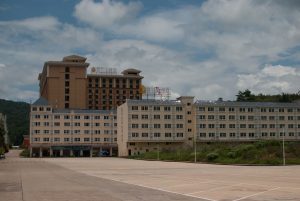Economic development zones in mainland Southeast Asia have contributed to a range of illicit activities, including drug trafficking and wildlife trafficking, according to a new report from C4ADS, a U.S.-based research organization.
The report, which analyzes 110 economic development zones (EDZs) in the five lower Mekong nations – Vietnam, Cambodia, Laos, Thailand, and Myanmar – found that while these zones have stoked economic growth, corruption, opacity, and weak regulatory frameworks have undermined their benefits.
“While the creation of an EDZ is typically followed by an increased pace of development, zones can also facilitate adverse outcomes that undercut the benefits to economic growth,” the report states. “Without proper management, EDZs can serve as staging grounds for multiple types of transnational illicit activity and geopolitical machinations.”
In recent years, EDZs have proliferated across the lower Mekong region as its governments have sought to attract foreign investment and fire up their economies. Based on analysis of satellite imagery and location-based mobile phone data, the C4ADS report concludes that the region’s EDZs have generally fulfilled their definitional goal of attracting investment and generating economic activity, with many seeing rapid expansion in recent years.
Zooming down to ground level, however, reveals a more ambiguous picture. According to C4ADS, the lax regulations designed to attract foreign investment have in many cases allowed illicit actors to exploit the zones to conduct a host of negative activities, “including corruption, environmental degradation, land conflict, drug trafficking, and wildlife trafficking.”
According to C4ADS, around 60 percent of the 110 Mekong region EDZs analyzed by C4ADS were associated with at least one report of environmental degradation or conflict with local communities over land.
One example it offers is the MDS Thmor Da Special Economic Zone, which was established in 2010 in central Cambodia. The report shows that the zone has seen rapid construction and development, particularly since 2017. However, the company that manages the zone, Try Pheap Group Co., Ltd., has been credibly linked to rampant illegal logging operations, environmental degradation, and the displacement of local communities.
Another is the Myanmar Yatai Shwe Kokko Special Economic Zone on Myanmar’s border with Thailand, a multibillion-dollar joint venture between the Hong Kong-registered Yatai International Holding Group and a Border Guard Force linked to the Myanmar military. In addition to a host of illicit activities, including gambling operations, the project has drawn criticism for forced land confiscations that have impacted nearby villagers.
C4ADS also noted that Mekong EDZs were “vulnerable to exploitation for the trafficking of illicit goods such as drugs and wildlife products.” As the United Nations Office on Drugs and Crime noted in its most recent report on the Asian synthetic drug market, the region’s anti-drug authorities confiscated a record of almost 170 tons of methamphetamine last year, up 19 percent from 2019 and more than double the 82.5 tons seized in 2017. A large proportion of this was produced in eastern Myanmar, and was trafficked through the lower Mekong region en route to overseas markets.
According to the C4ADS report, EDZs have become nodes for this traffic, particularly those situated in remote border areas. The same is true of wildlife trafficking, which has been documented in a number of EDZs, including the Beautiful Boten Land Specific Economic Zone on the border between Laos and China, and the Golden Triangle SEZ, which sits inside Laos, close to its borders with Thailand and Myanmar. The same is true at the Mong Cai SEZ in Vietnam and at Mong La, a rebel-controlled region on the Myanmar-China border. This gels with the findings of recent market surveys by the wildlife watchdog TRAFFIC, which I wrote about last week, which noted the prevalence of such trades inside the region’s special economic zones.
Another interesting development that the report notes is the increasing prominence of private security companies, many of them from China, who are contracted to safeguard investments in EDZs, especially in unstable border regions. According to the report, China-based companies account for 29 of the 49 foreign private security firms operating in Cambodia and Myanmar, the only two countries where official corporate registries provided enough information to confirm foreign ownership.
One of those identified by C4ADS was the Hongmen Security Company, which is associated with Wan Kuok Koi. Wan is the former leader of the Macau 14K Triad who has been sanctioned by the U.S. Treasury for corrupt activities in Myanmar and Cambodia.
According to C4ADS, illicit and criminal activity in EDZs has been compounded by the lack of transparency around these special zones, particularly over information like customs data, land titles, and corporate records.
In many ways, the lack of transparency and the illicit activities both reflect the prevailing political economy the region, which is characterized by weak regulatory frameworks, overlapping political jurisdictions, clientelistic politics, and venal elites, all of which are exacerbated by the demand-side spur of proximity to China’s giant market.
This is particularly true of the rugged regions running along the borders of China, Thailand, Laos, and Myanmar, which have evaded central state control for most of recorded history – but are currently more integrated with China than at any time in the past.
This suggests that barring concerted government attempts to improve the management of EDZs and tackle broader governance challenges – an uncertain prospect at present – illicit activities will continue to flourish in these “zones of exception” far from the reach of the state.

































